Abstract
•Objective
To determine the effectiveness of glucocorticoid treatment in children with croup.
•Design
Meta-analysis of randomized controlled trials that examine the effectiveness of glucocorticoid treatment in children with croup.
•Main outcome measures
Score on scale measuring severity of croup,use of co-interventions (epinephrine, antibiotics, or supplemental glucocorticoids), length of stay in the emergency department or the hospital, and rate of hospitalization.
•Results
Twenty-four studies met the inclusion criteria. Glucocorticoid treatment was associated with an improvement in the croup severity score at 6 hours with an effect size of -1.0 (95% confidence interval [CI] -1.5 to -0.6) and at 12 hours -1.0 (-1.6 to -0.4); at 24 hours, this improvement was no longer significant (-1.0, -2.0 to -0.1). There was a decrease in the number of epinephrine treatments needed in children treated with glucocorticoids: a decrease of 9% (95% CI 2% to 16%) among those treated with budesonide and of 12% (4% to 20%) among those treated with dexamethasone. There was also a decrease in the length of time spent in the emergency department (-11 hours, 95% CI -18 to 4 hours) and, for inpatients, hospital stay was reduced by 16 hours (-31 to 1 hour). Publication bias seems to play a part in these results.
•Conclusions
Dexamethasone and budesonide are effective in relieving the symptoms of croup as early as 6 hours after treatment. Fewer co-interventions are used, and the length of time spent in the hospital is decreased in patients treated withglucocorticoids.
Full text
PDF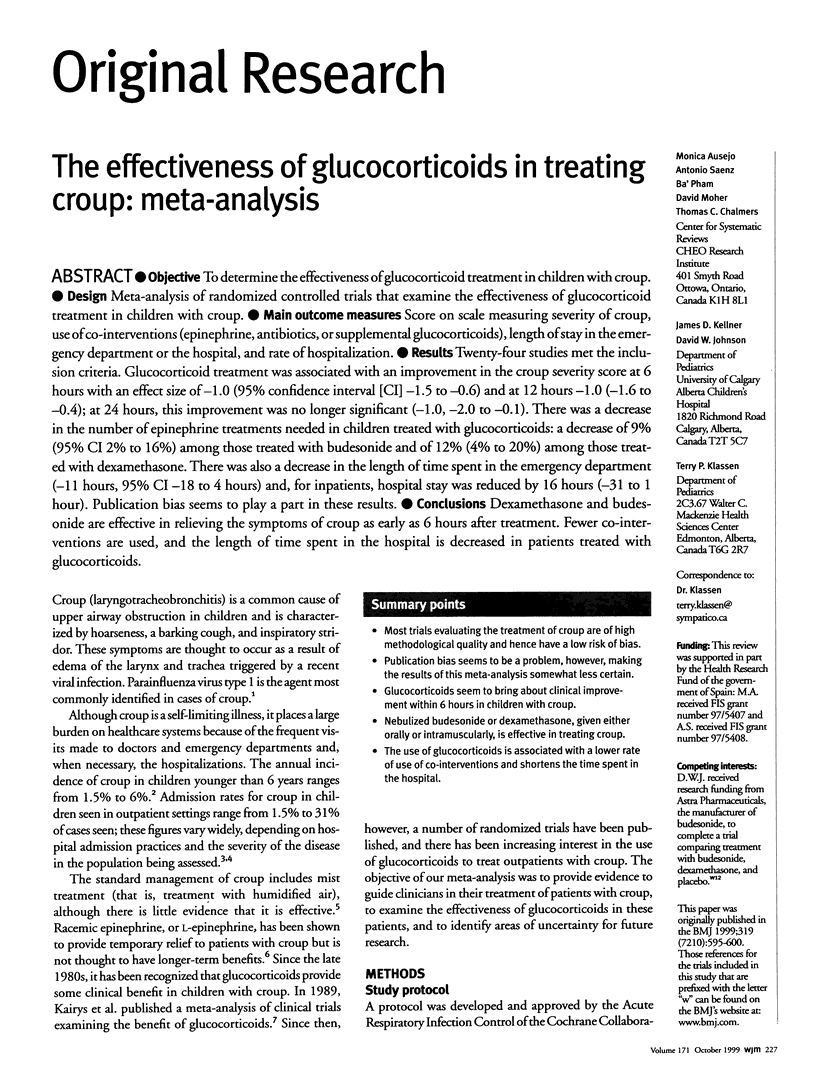
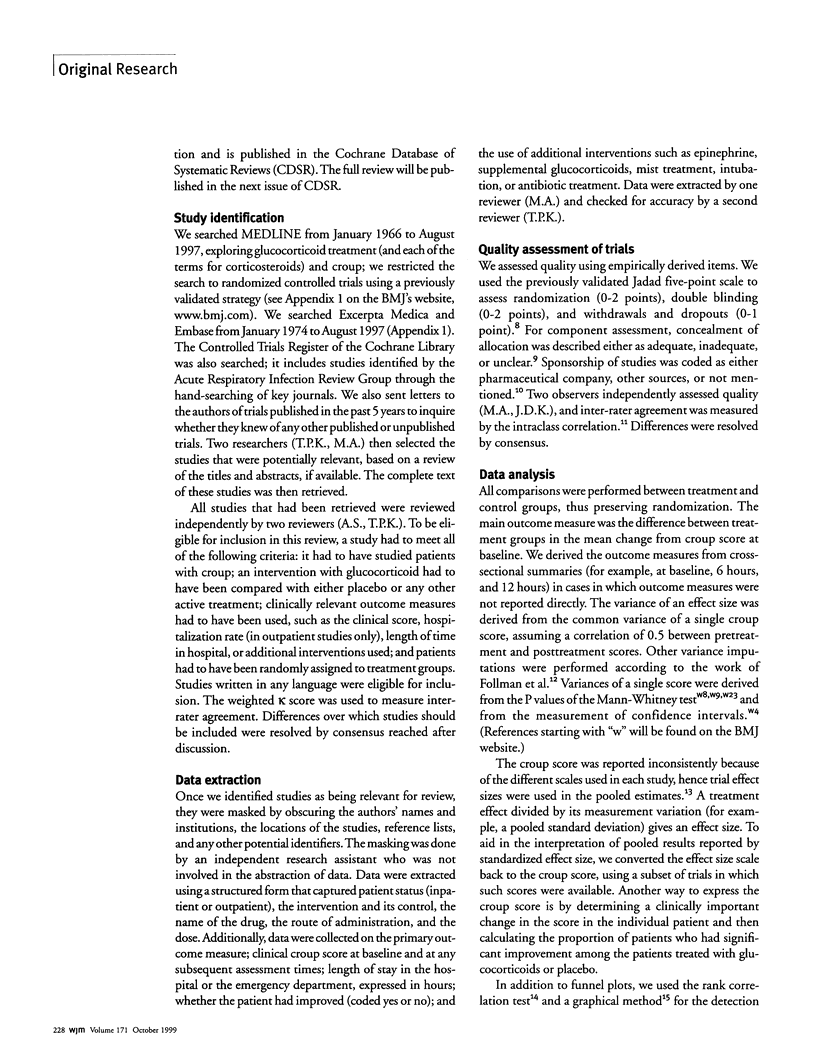
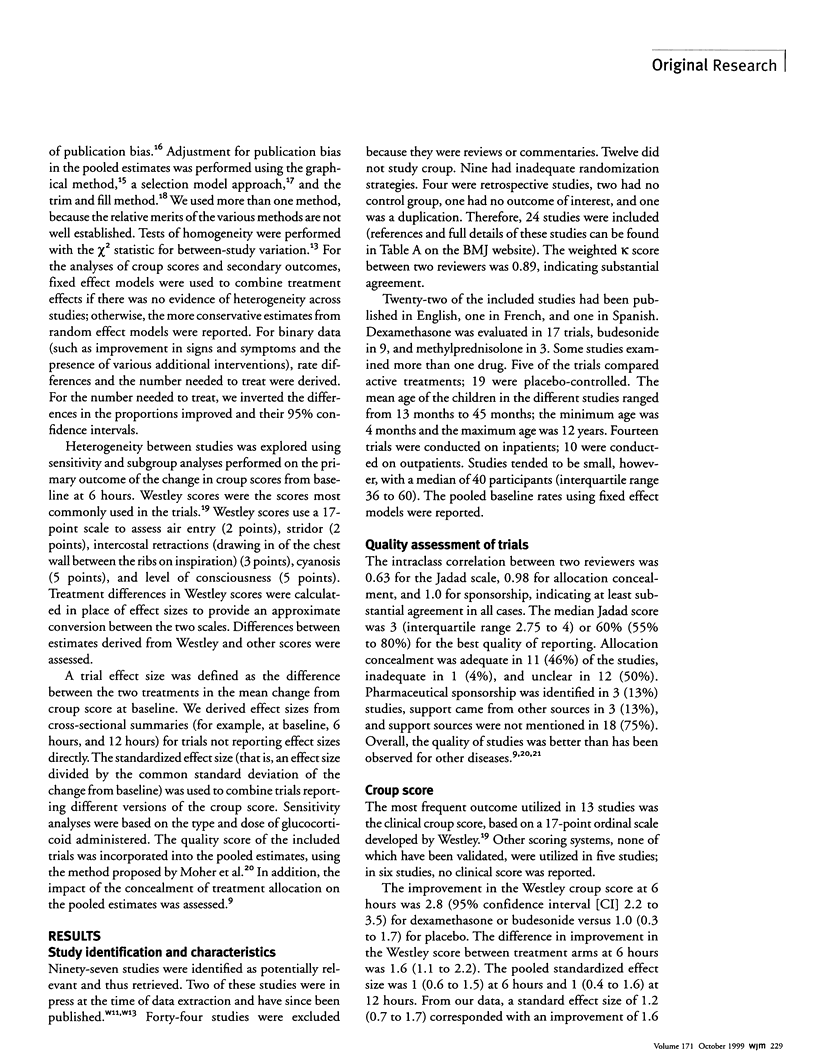
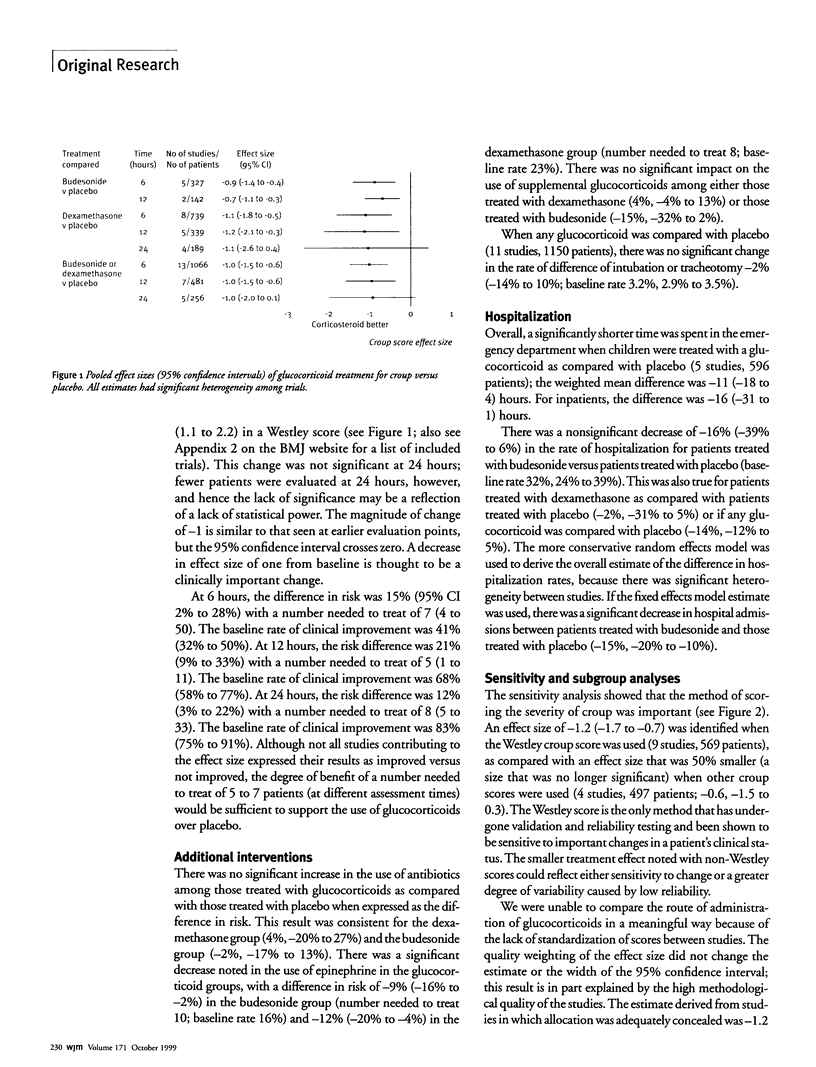
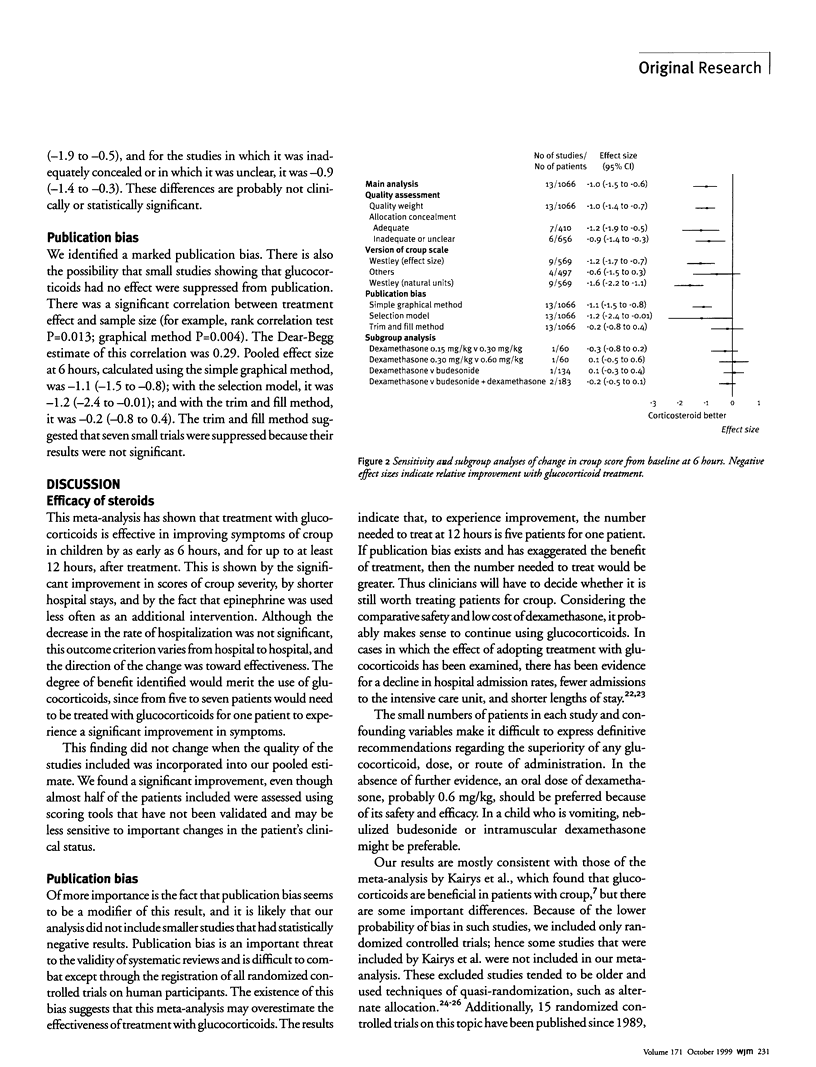
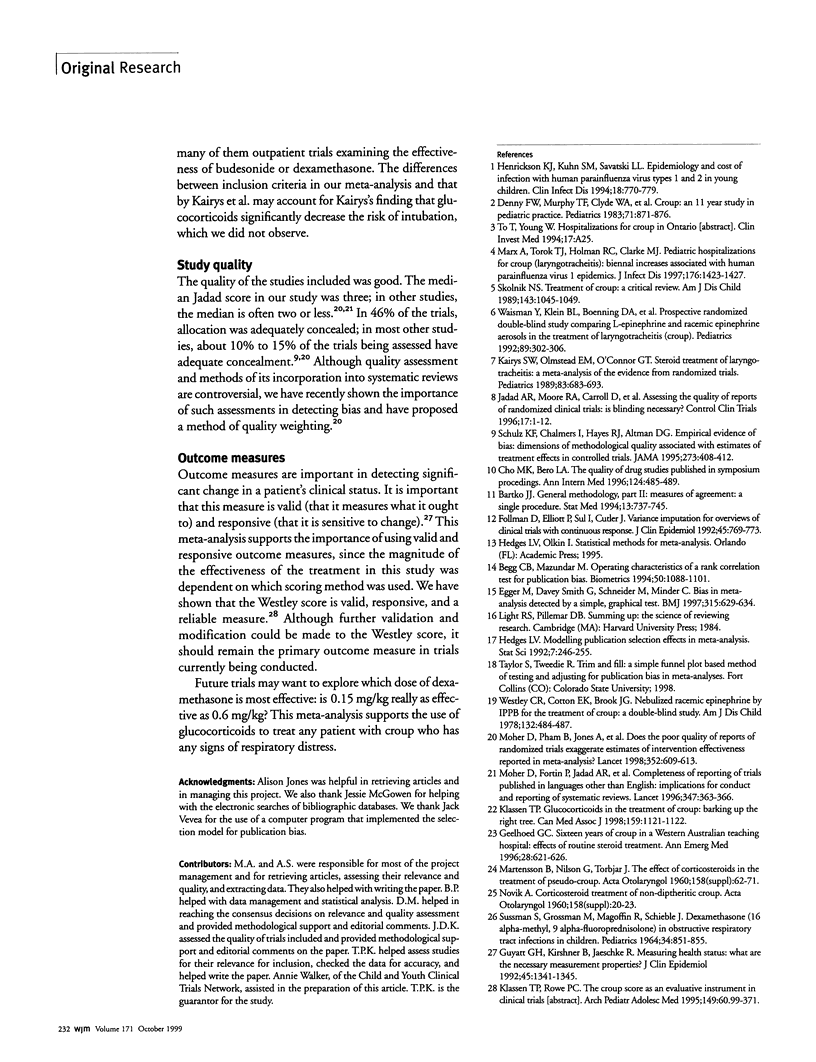
Images in this article
Selected References
These references are in PubMed. This may not be the complete list of references from this article.
- Bartko J. J. Measures of agreement: a single procedure. 1994 Mar 15-Apr 15Stat Med. 13(5-7):737–745. doi: 10.1002/sim.4780130534. [DOI] [PubMed] [Google Scholar]
- Begg C. B., Mazumdar M. Operating characteristics of a rank correlation test for publication bias. Biometrics. 1994 Dec;50(4):1088–1101. [PubMed] [Google Scholar]
- Cho M. K., Bero L. A. The quality of drug studies published in symposium proceedings. Ann Intern Med. 1996 Mar 1;124(5):485–489. doi: 10.7326/0003-4819-124-5-199603010-00004. [DOI] [PubMed] [Google Scholar]
- Denny F. W., Murphy T. F., Clyde W. A., Jr, Collier A. M., Henderson F. W. Croup: an 11-year study in a pediatric practice. Pediatrics. 1983 Jun;71(6):871–876. [PubMed] [Google Scholar]
- Egger M., Davey Smith G., Schneider M., Minder C. Bias in meta-analysis detected by a simple, graphical test. BMJ. 1997 Sep 13;315(7109):629–634. doi: 10.1136/bmj.315.7109.629. [DOI] [PMC free article] [PubMed] [Google Scholar]
- Follmann D., Elliott P., Suh I., Cutler J. Variance imputation for overviews of clinical trials with continuous response. J Clin Epidemiol. 1992 Jul;45(7):769–773. doi: 10.1016/0895-4356(92)90054-q. [DOI] [PubMed] [Google Scholar]
- Geelhoed G. C. Sixteen years of croup in a Western Australian teaching hospital: effects of routine steroid treatment. Ann Emerg Med. 1996 Dec;28(6):621–626. doi: 10.1016/s0196-0644(96)70084-7. [DOI] [PubMed] [Google Scholar]
- Guyatt G. H., Kirshner B., Jaeschke R. Measuring health status: what are the necessary measurement properties? J Clin Epidemiol. 1992 Dec;45(12):1341–1345. doi: 10.1016/0895-4356(92)90194-r. [DOI] [PubMed] [Google Scholar]
- Henrickson K. J., Kuhn S. M., Savatski L. L. Epidemiology and cost of infection with human parainfluenza virus types 1 and 2 in young children. Clin Infect Dis. 1994 May;18(5):770–779. doi: 10.1093/clinids/18.5.770. [DOI] [PubMed] [Google Scholar]
- Jadad A. R., Moore R. A., Carroll D., Jenkinson C., Reynolds D. J., Gavaghan D. J., McQuay H. J. Assessing the quality of reports of randomized clinical trials: is blinding necessary? Control Clin Trials. 1996 Feb;17(1):1–12. doi: 10.1016/0197-2456(95)00134-4. [DOI] [PubMed] [Google Scholar]
- Kairys S. W., Olmstead E. M., O'Connor G. T. Steroid treatment of laryngotracheitis: a meta-analysis of the evidence from randomized trials. Pediatrics. 1989 May;83(5):683–693. [PubMed] [Google Scholar]
- Klassen T. P. Glucocorticoids in the treatment of croup: barking up the right tree. CMAJ. 1998 Nov 3;159(9):1121–1122. [PMC free article] [PubMed] [Google Scholar]
- MARTENSSON B., NILSSON G., TORBJAR J. E. The effect of corticosteroids in the treatment of pseudo-croup. Acta Otolaryngol Suppl. 1960;158:62–69. doi: 10.3109/00016486009122395. [DOI] [PubMed] [Google Scholar]
- Marx A., Török T. J., Holman R. C., Clarke M. J., Anderson L. J. Pediatric hospitalizations for croup (laryngotracheobronchitis): biennial increases associated with human parainfluenza virus 1 epidemics. J Infect Dis. 1997 Dec;176(6):1423–1427. doi: 10.1086/514137. [DOI] [PubMed] [Google Scholar]
- Moher D., Fortin P., Jadad A. R., Jüni P., Klassen T., Le Lorier J., Liberati A., Linde K., Penna A. Completeness of reporting of trials published in languages other than English: implications for conduct and reporting of systematic reviews. Lancet. 1996 Feb 10;347(8998):363–366. doi: 10.1016/s0140-6736(96)90538-3. [DOI] [PubMed] [Google Scholar]
- Moher D., Pham B., Jones A., Cook D. J., Jadad A. R., Moher M., Tugwell P., Klassen T. P. Does quality of reports of randomised trials affect estimates of intervention efficacy reported in meta-analyses? Lancet. 1998 Aug 22;352(9128):609–613. doi: 10.1016/S0140-6736(98)01085-X. [DOI] [PubMed] [Google Scholar]
- NOVIK A. Corticosteroid treatment of non-diphtheritic croup. Acta Otolaryngol Suppl. 1960;158:20–22. [PubMed] [Google Scholar]
- SUSSMAN S., GROSSMAN M., MAGOFFIN R., SCHIEBLE J. DEXAMETHASONE (16-ALPHA-METHYL, 9-ALPHA-FLUOROPREDNISOLONE) IN OBSTRUCTIVE RESPIRATORY TRACT INFECTIONS IN CHILDREN. A CONTROLLED STUDY. Pediatrics. 1964 Dec;34:851–855. [PubMed] [Google Scholar]
- Schulz K. F., Chalmers I., Hayes R. J., Altman D. G. Empirical evidence of bias. Dimensions of methodological quality associated with estimates of treatment effects in controlled trials. JAMA. 1995 Feb 1;273(5):408–412. doi: 10.1001/jama.273.5.408. [DOI] [PubMed] [Google Scholar]
- Skolnik N. S. Treatment of croup. A critical review. Am J Dis Child. 1989 Sep;143(9):1045–1049. doi: 10.1001/archpedi.1989.02150210079022. [DOI] [PubMed] [Google Scholar]
- Waisman Y., Klein B. L., Boenning D. A., Young G. M., Chamberlain J. M., O'Donnell R., Ochsenschlager D. W. Prospective randomized double-blind study comparing L-epinephrine and racemic epinephrine aerosols in the treatment of laryngotracheitis (croup). Pediatrics. 1992 Feb;89(2):302–306. [PubMed] [Google Scholar]
- Westley C. R., Cotton E. K., Brooks J. G. Nebulized racemic epinephrine by IPPB for the treatment of croup: a double-blind study. Am J Dis Child. 1978 May;132(5):484–487. doi: 10.1001/archpedi.1978.02120300044008. [DOI] [PubMed] [Google Scholar]




